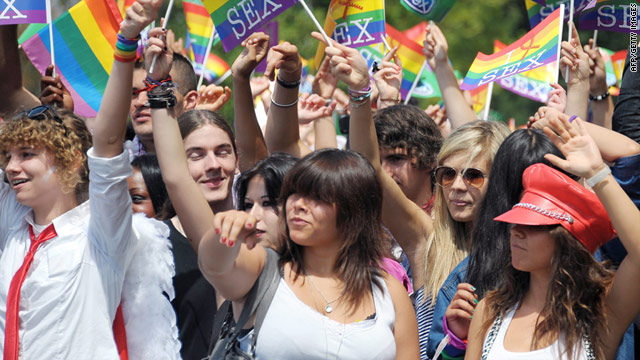U.N. council passes gay rights resolution
June 17, 2011 7:00 p.m. EDT

People celebrate during a gay pride march this month in Strasbourg, France.
STORY HIGHLIGHTS
- U.N. Human Rights Council resolution passes 23-19, with three abstentions
- Some African nations criticize South Africa, which introduced the gay rights measure
- The move "puts the issue squarely on the U.N.'s agenda," a U.S. official says
- "This is really a critical beginning of a universal recognition of a new set of rights," she says
The resolution, introduced by South Africa, is the first-ever U.N. resolution on the human rights of lesbian, gay, bisexual and transgendered persons.
It passed with 23 votes in favor, 19 opposed and three abstentions amid strong criticism of South Africa by some African nations.
Suzanne Nossel, deputy assistant secretary of state for international organizations, told CNN, "It really is a key part in setting a new norm that gay rights are human rights and that that has to be accepted globally."
"It talks about the violence and discrimination that people of LGBT persuasion experience around the world," she said, "and that those issues ... need to be taken seriously. It calls for reporting on what's going on, where people are being discriminated against, the violence that is taking place, and it really puts the issue squarely on the U.N.'s agenda going forward."
 New York to legalize same-sex marriage?
New York to legalize same-sex marriage? RELATED TOPICS
The State Department lobbied intensively for the resolution, and Nossel said the United States was pleased to see African leadership, from South Africa in particular, as well as strong support from South America, Colombia and Brazil.
The resolution also will commission the first-ever U.N. report on the challenges that lesbian, gay, bisexual and transgendered people face around the globe. Nossel said the Obama administration hopes it will "open a broader international discussion on how to best promote and protect the human rights of LGBT persons."
In March the U.N. Human Rights Council adopted a statement, supported by 85 countries, on gay rights called "Ending Violence Based on Sexual Orientation and Gender Identity."
Friday's vote "marks a victory for defenders of human rights," said Susan Rice, the U.S. ambassador to the United Nations. "It sends a clear message that abuses based on sexual orientation and gender identity must end."
U.S. Secretary of State Hillary Clinton has made gay rights a key focus of the State Department's human rights agenda, expressing her view that "gay rights are human rights and human rights are gay rights."
At a gay pride event this month at the State Department, Clinton said, "Men and women are harassed, beaten, subjected to sexual violence, even killed, because of who they are and whom they love. Some are driven from their homes or countries, and many who become refugees confront new threats in their countries of asylum. In some places, violence against the LGBT community is permitted by law and inflamed by public calls to violence; in others, it persists insidiously behind closed doors."
Nossel told CNN, "it's not like discrimination or violence are going to end overnight" because of the U.N. resolution, "but now ... when there are proposals in parliaments or legislatures around the world to illegalize gay activity or repress people because of their sexual orientation, opponents can point to this and say, 'Hey, the U.N. has spoken out, there is a resolution that rejects this squarely.'
"That is the way these international norms are built," she said. "It's not from scratch. On women's rights, on minority rights, it builds up over time. So this is really a critical beginning of a universal recognition of a new set of rights that forms part of the international system."
.

6 comments:
I believe that Hillary said it all when she said, "gay rights are human rights and human rights are gay rights."
Nice one, Hillie babe.
What we are seeing is a tsunami of the civilized insisting on fairness for the gays of this world. In 10 years we won't be able to recognise things.
"All for one. . .and one for all" was another good one. hehe
This current from The Lady Hilary is brilliant. . . . lol
WoW J. . we have a prophet in our midst! ;-) I hope you are totally correct. . . can you imagine, even. .?
I think J's right. I'm 66 and in 10 years I won't recognize anything at all. Hehe.
Now... how do I get outta here? Oh yeah... click.
GARY. . . .never will happen. . .Mother Nature would never do that to YOU. . . . She wouldn't dare! Be hell to pay!
ho ho ho
Post a Comment